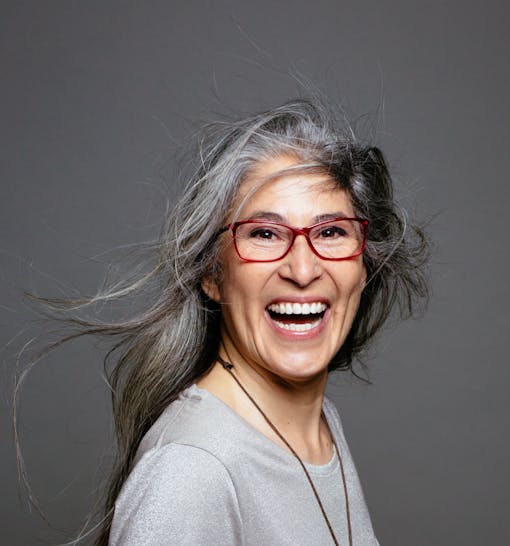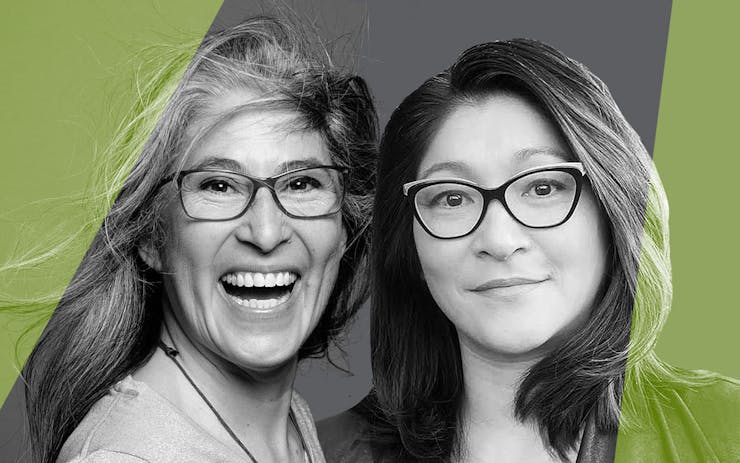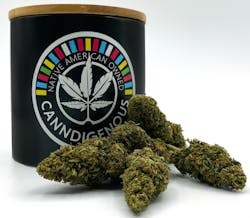On a recent Friday evening in a private home near Walnut Creek, California, several accomplished, professional middle-aged women gathered to learn about cannabis.
The authors of a new book on cannabis and CBD explain it all, clearly and without apology or puns.
Sipping LaCroix and nibbling on cheese and grapes, they were excited to meet Dr. Junella Chin and Aliza Sherman, authors of the new book, Cannabis & CBD for Health and Wellness: An Essential Guide for Using Nature’s Medicine to Relieve Stress, Anxiety, Chronic Pain, Inflammation, and More.
Like most of America, they’d heard all about CBD but knew next to nothing about it. That’s a learning gap Chin and Sherman hope to close.
Cannabis & CBD, published earlier this month, details the history, botany, science, chemical compounds, case studies, and practical uses of cannabis. The book is a comprehensive and beautifully designed primer that’s perfect for newcomers—and will fill in the knowledge gaps for more experienced patients and consumers.

An expert guide for non-experts, without stigma, fear, or lame puns. Sherman and Chin get it right. (Courtesy Random House)
Whether as a wine replacement, a substitute for anti-anxiety medication, to ease the symptoms of menopause, or to aid with sleep, there are a myriad of reasons for women to seek out cannabis.
CBD helped Dr. Chin get through med school. Cannabis eased Sherman's insomnia and neck pain.
But the knowledge barrier to entering the market remains large. That presented an opportunity for female educators and health professionals like Sherman and Chin.
Aliza Sherman is the CEO of Ellementa, a women’s wellness network that offers online resources and connects women in cities across the country at gatherings like the one in Walnut Creek, to learn about cannabis from expert speakers and connect with trusted brands. Junella Chin specializes in osteopathic manipulative medicine, and is currently treating patients in New York City as an integrative cannabis physician.
Prior to the event in Walnut Creek, I sat down with Sherman and Chin for a wide-ranging conversation about their new book and their experiences with cannabis. Our conversation has been edited for length and clarity.

Dr. Junella Chin: CBD helped her manage a spinal disease and make it through med school. (Jake Elwood photo, courtesy Random House)
Leafly: How did the two of you meet?
Both women laugh.
Junella Chin (JC): We just met!
Aliza Sherman (AS): We didn’t meet until last week. We wrote the book and had not met in person until literally last week when we started our book tour together.
Leafly: Oh wow!
AS: I knew of June from Ellementa New York City. She was invited to speak there by the local leader in New York, and it went really well. I read up on her and took a look online. I saw a lot of great, credible information. I wanted a co-author, preferably a doctor and a woman, and she fit the bill. I invited her to write the book with me and she said yes.
Leafly: How did cannabis enter your life?
AS: A lot of people in this industry have had some kind of physical, mental or even spiritual awakening because they accepted the fact that this plant can be helpful.
'I thought cannabis was dangerous and illegal and would ruin my brain. It wasn’t until in my early fifties that I began to realize it was medicine.'
I was resistant to it for so many years. I dabbled in high school and college, but it wasn’t something I thought I should have in my life because of the stigma. I thought it was dangerous and illegal and would ruin my brain.
It wasn’t until in my early fifties when I was suffering that I began to realize it was medicine. … I started researching it and I thought ‘Wow, maybe I could use this for my insomnia and chronic neck pain.’” I tried it and it worked.
Shop highly rated dispensaries near you
Showing you dispensaries nearI was really excited about the discovery, and I wondered why more people don’t know about this. As a writer, communicator, speaker and teacher, I wanted to teach women about it.

Aliza Sherman: After finding relief from insomnia and neck pain, she’s now teaching other women about medical cannabis. (Photo: Ageist, courtesy Random House)
A Challenging Spinal Disease
Leafly (To Chin): What about your personal journey with cannabis?
JC: I became a patient before I graduated from medical school. As a teenager, I was diagnosed with a debilitating spinal disease, and that led to years of chronic pain.
'An HIV/AIDS doctor told me about CBD oil. He said it helped his patients with pain and didn't make them feel altered.'
I cycled through all of the conventional therapies: medications, epidurals, physical therapy, massage, acupuncture, rolfing. When I got to medical school I found that the only thing that worked was medication and a brace—that was short-lived, but it got me through chunks of time.
I started doing rounds at the hospital, working 80 hours a week. I had a really hard time standing. One of my attending physicians noticed, and he asked me what was going on. He said “You’re not going to be able to finish medical school like this, to be honest with you. You have a long way to go.”
Getting Through Med School
I explained that I had ankylosis spondylitis—AS. He knew about it, and he knew that there was no cure. All you can do is find symptomatic relief. Dr. Levine was an HIV/AIDS doctor, and he’s the one who offered me marijuana in a tincture form. He said “This is what my HIV and AIDS patients use. It really helps them with pain and it doesn’t make them feel altered.” He didn’t call it CBD oil at the time. He just said it was a different kind of cannabis plant.
I grew up in the Bronx. I was pre-med, I had my eye on the prize, so I didn’t experiment with cannabis. I had an opinion about it—it was for gangsters and high school dropouts. I grew up in a strict Chinese household, and I was taught that it caused psychosis. But I had to try it—either that or drop out of medical school. So, I tried it over a weekend. By Monday I knew it was working. To my amazement, something was changing. I was able to stand and wash the dishes. I could sit for more than a half-hour to study.
I just happened to be in the right place at the right time. I went to medical school in California shortly after it legalized here medically [in 1996], so I was able to learn everything I could about both this plant and about conventional medicine. It was the best of both worlds. I decided to dedicate my career to helping patients integrate medical cannabis safely.
Everybody’s Talking About CBD
Leafly: It’s interesting that the book’s title is Cannabis & CBD. How do you feel about the trendiness of CBD and its promotion to people who may not know what it is?
AS: There are pros and cons. The pros are that when everyone’s talking about it, it’s normalized.
'Everyone’s hearing about CBD and thinking that it’s going to be a miracle cure for them. But they really have no idea what's in it.'
Even if it’s trendy, it’s out in the open. People don’t understand that CBD is cannabis and it comes from the cannabis plant. It’s a variation, but it’s still cannabis. Even legislators, they have no idea.
The downside is that everyone’s hearing about it and thinking that it’s going to be a miracle cure for them. They think something is better or healthier because it has CBD in it. But they really have no idea what’s in it—if it’s been cleaned, if pesticides and heavy metals have been removed. They could be taking in toxins and they have no clue.
JC: Other health care practitioners don’t realize that CBD is cannabis, and they feel better saying, sure you can prescribe CBD oil. So it’s semantics. My older patients, 65 and older, always come in and say “I don’t want marijuana, I want CBD.”
So that’s why we named the book Cannabis & CBD. We talked with the publisher and went through different titles, and they said ‘Cannabis and CBD are separated so much in our culture, it would be a good title and then you can delve into it.’”
Leafly: Are there negative side effects to using CBD that aren’t discussed?
JC: Absolutely. It’s not a silver bullet. It can be contraindicated with certain medications. It can change the way your prescription medications and natural supplements work. If you take too much CBD, it can cause nausea or diarrhea. There’s a subset of patients that can’t tolerate the cannabis plant at all, they get very ill or depressed, have trouble sleeping and get anxiety, and that’s something that needs to be discussed. It’s not a cure-all.
Opening Medical Culture
Leafly: Why do you think more MDs aren’t educating themselves about the endocannabinoid system or cannabis in general?
JC: We don’t learn about it in medical school or residency.
'We don't learn about the endocannabinoid system in med school. But I'm now teaching it to pharmacists.'
I’m just starting to do grand rounds, teaching it to pharmacists. I just did a symposium at a medical school in New York, and after that I got so many calls from medical students wanting to shadow me in the office, so it’s starting. But we still can’t prescribe it—we can only recommend it—and there’s a liability with it, it’s still federally regulated. It’s not covered by my malpractice insurance, and if I have an affiliation with a hospital, they’re very clear that they don’t cover you if you recommend it and something goes wrong.
MDs as a whole are very conservative. We follow a linear path. This is botanical medicine with a broader therapeutic window than pharmaceutical meds, and that’s not what conventional healthcare is about.
Leafly: For better or for worse.
AS: Exactly. There’s definitely something to be said about the benefits of regulation—including mandatory testing. A lot of CBD products aren’t tested.
It’s not for us to promote an opinion of which products are best. We don’t say that “isolates are terrible and full-spectrum – whole plant is better.” We explain that there’s a place for each. Isolates are more limited in their ability; full-spectrum CBD has a broader potential to be beneficial for many more things. We let the consumer decide.
What’s Coming Next
Leafly: Over the next five to ten years, what do you think the potential is for cannabis to change medicine as we know it?
JC: I think there will be more research into the biosynthetic version of cannabis. If it’s genetically-modified yeast creating cannabinoids, making it in an isolate form with molecular consistency, then the pharmaceutical industry will embrace it and healthcare practitioners will as well. Ultimately I think that’s where it’s going to go: towards the development of pharmaceutical-based cannabinoids.
AS: For better or for worse. There is a beauty and harmony to nature’s medicine. But the variability scares and confuses people. We’re trying to get to the people that think it’s too complicated and simplify it for them so they can embrace something that’s more natural. Because once it’s a pharmaceutical, it’s very different from the way nature intended.
JC: I think there’s a place for both. With plant medicine, when you’re pulling apart the molecules of the plant, you’re not going to get the benefits of the synergism of the whole plant compound.





